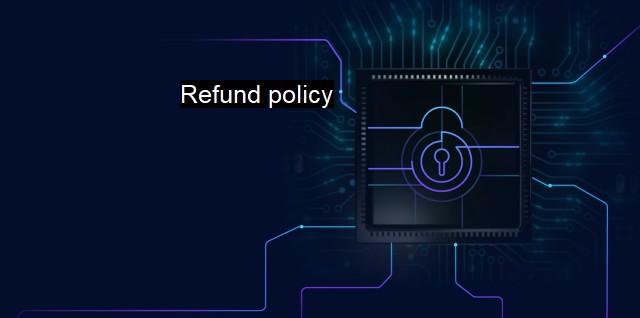What is Refund policy?
Why a Refund Policy is Crucial in Cybersecurity & Antivirus: Safeguarding Customer Trust & Satisfaction
The concept of a “refund policy” is a fundamental aspect of consumer rights and is associated with business transactions and contracts. In the context of cybersecurity and antivirus industries, a refund policy incorporates terms and conditions that govern customers who seek compensations after they subscribe to, purchase, or use products and services offered by cybersecurity companies. These products and services, either a software or a hardware, endeavor to ensure that computer systems, networks, and digital data remain shielded from cyber threats.An antivirus or other cybersecurity protection program offers a safeguard for data and protects the integrity of systems from possible vulnerabilities. One concurrent reality though is, antivirus security products do not always work flawlessly and some difficulties may arise from the implementation and use of these strategies, leading to unsatisfactory user experiences. In such occurrences, disgruntled clients seek a refund of the amount they spent on unfulfilling products and services, thus the importance of an ethical, practical, and enforceable refund policy.
A refund policy in terms of antivirus softwares capitalizes on two key facets of business: building customer trust and honoring the implied warranty of serviceability. Conducting business in the era of the internet, refund policies for digital services -such as digital products, apps, online courses, and particularly antivirus software- have gained substantial importance. Users increasingly run the risk of cyber attacks and data theft, hence more and more people purchase antivirus software.
Sometimes users may not feel fully satisfied with the service, due to reasons like the program not working proficiently, false positive outcomes, the software’s inconsistencies with the client's system, or inadequate customer service response. Most businesses in the cybersecurity and antivirus sectors offer refunds to clients dissatisfied with their first purchase, usually within a specified duration like 30-days of making the purchase. Such customer-friendly policies boost the customers' confidence in the company's products.
Cybersecurity and antivirus software often require technical know-how to install and operate, where not every customer is adept. Hence, instances of unresolved setup glitches, misunderstanding the product specifications, consistent system errors, or mere dissatisfaction with the antivirus software breed usability issues and give impetus for a refund. The proficiency of a company's customer service in resolving client's grievances also plays a role, noteworthy to clients and consumer forums to distinguish companies that pay tribute to their refund policy compared to those that don’t.
Relevant chargeback insurance is another essential perspective of a refund policy in both cybersecurity and antivirus software industries. With the rise of e-commerce and virtual payment systems, online scams that siphon funds of guiltless consumers have been rampant. Consequently, companies have devoted efforts to devise robust systems to curb such incidents. When online fraud occurs, cybersecurity firms that offer chargeback insurance to clients as part of their refund policy are especially commendable as it earns them consumer trust and reliability.
Despite the existence of well-crafted refund policies, companies operating in this space must affirm a delicate equilibrium of interests between maintaining sustainable revenues and honoring refunds without promoting injustice to asymmetric information access. An unrestricted, generous refund policy risked being exploited by users who use the services and request refunds in quick successions – suggesting refund policy abuse of system-trusting measures. Therefore, a well-structured refund policy of high standard is helm within the power of consumer hedonic demand, preserve firm's ethical conviction, and limit moral hazards.
This vital consumer protection tool becomes doubly significant amidst increasing dependencies on digital technology given today’s digital-centric commercial platforms. To navigate through this, companies need to draft a comprehensive refund policy that ensures transparency, sets trustful user expectations, and guarantees consumer rights protection in the context of cybersecurity and antivirus software.

Refund policy FAQs
What is the refund policy for your cybersecurity and antivirus product?
Our refund policy states that we offer a 30-day money-back guarantee for all our cybersecurity and antivirus products. If you're unsatisfied with your purchase, you can request a refund within 30 days of purchase.What is the process for requesting a refund for your cybersecurity and antivirus product?
To request a refund for our cybersecurity and antivirus product, you can reach out to our customer support team through email or phone. Our team will process your refund request and provide you with further instructions on how to return the product.Are there any conditions to qualify for a refund for your cybersecurity and antivirus product?
To qualify for a refund, the product must be returned in its original packaging and condition. Additionally, the refund request must be made within 30 days of purchase. We reserve the right to deny refunds in cases of fraud or abuse of our refund policy.What happens if I experience technical issues with your cybersecurity and antivirus product after the refund period has ended?
If you experience technical issues with our cybersecurity and antivirus product after the refund period has ended, our customer support team will be happy to assist you. However, we won't be able to provide a refund for the product.| | A | | | B | | | C | | | D | | | E | | | F | | | G | | | H | | | I | | | J | | | K | | | L | | | M | |
| | N | | | O | | | P | | | Q | | | R | | | S | | | T | | | U | | | V | | | W | | | X | | | Y | | | Z | |
| | 1 | | | 2 | | | 3 | | | 4 | | | 7 | | | 8 | | |||||||